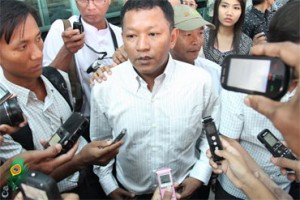Government Uses Political Prisoners as Bargaining Chips Yet Again
By Burma Partnership • April 30, 2013 On 23 April, Burma’s government announced a presidential amnesty for 93 prisoners. Media originally reported that this included 59 political prisoners, however, the Assistance Association for Political Prisoners (AAPP) has confirmed the names of 63 released. Among those released were 40 Shan soldiers, reportedly from the Shan State National Army, and former majority shareholder of the Myanmar Times, Sonny Swe.
On 23 April, Burma’s government announced a presidential amnesty for 93 prisoners. Media originally reported that this included 59 political prisoners, however, the Assistance Association for Political Prisoners (AAPP) has confirmed the names of 63 released. Among those released were 40 Shan soldiers, reportedly from the Shan State National Army, and former majority shareholder of the Myanmar Times, Sonny Swe.
In yet another illustration of the government using political prisoners as bargaining chips, the release happened the day after the European Union decided to lift all sanctions on Burma, except an arms embargo. Previous political prisoner releases also coincided with decisions made by the international community or visits by key international figures, such as US President Barack Obama’s visit last November.
Ko Bo Kyi from AAPP welcomed the amnesty, although he said the government failed to carry out the decision properly: “The release of the political prisoners should be publicly announced. The government should treat them with dignity,” he said. “They are somewhat like bargaining chips, used by the government to gain some achievements” from the international community. AAPP estimates that there are still more than 200 political prisoners.
It is problematic for national reconciliation that the government releases political prisoners without recognizing their status as such, and releases them alongside criminals. Furthermore, as with previous releases, this week’s political prisoners were released conditionally under Section 401 of the Criminal Procedure Code, which states that they can be re-arrested and ordered to serve the remainder of their original sentence for any violation of existing laws. Repressive laws long used to imprison dissidents, such as the Unlawful Associations Act, the Electronics Transactions Act and the State Protection Act, remain on the books. Additionally, lauded new laws, such as the Peaceful Assembly and Peaceful Procession Law, are being used to suppress the activities of activists and curtail freedoms of expression, assembly and association.
Released political prisoners continue to face many challenges after their release. Ko Tun Kyi, a member of the Former Political Prisoner Group, reiterated the need for rehabilitation of political prisoners who have been released, who need help with physical and mental health check-ups, vocational training and financial support. He also called for more civil society organizations to be involved in the rehabilitation of former political prisoners.
Thein Sein’s government must show its commitment to national reconciliation and rectify the situation of political prisoners by acknowledging the past mistreatment of political prisoners in prison and their political status upon release, permitting the verification committee to operate effectively and transparently, releasing all remaining political prisoners, and allowing for appropriate redress, rehabilitation and reintegration.
Tags: Burma Partnership, Political Prisoners, Release of Political PrisonersThis post is in: Blog
Related PostsBurma Partnership Celebrates Continuing Regional Solidarity for Burma and Embraces the Work Ahead for Progressive Voice
Burma Army Displays Blatant Disregard for 21st Century Panglong Peace Process
Ann Din Coal Power Plant: Local Movement and Action to Preserve and Protect Natural Resources and Land: Mon IDP Report Case Study #4
Latest Human Rights Abuse Case Demonstrates Urgent Need to Reform the Myanmar National Human Rights Commission
Human Rights Far From Guaranteed as US Sanctions on Burma Are Removed









 All posts
All posts